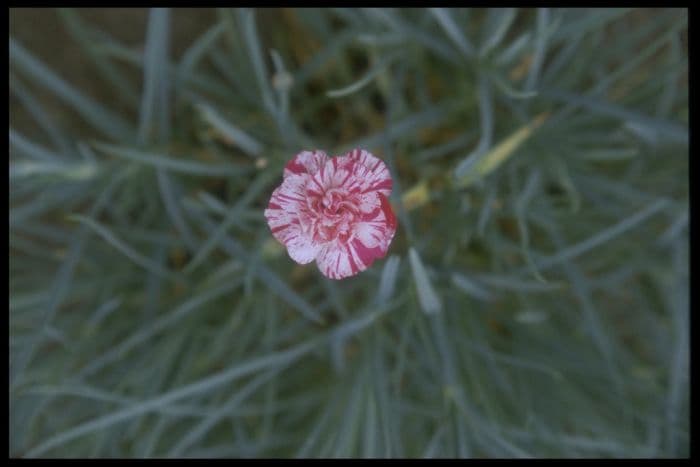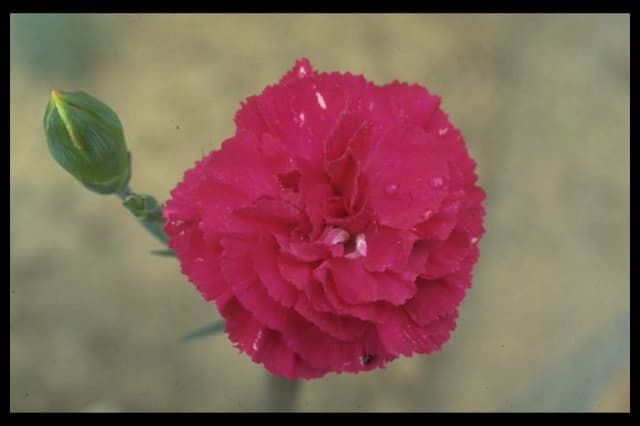Sweet William Dianthus 'Albert Hill' (p)

ABOUT
The Dianthus 'Albert Hill,' commonly known as a type of carnation or pink, bears the characteristic charm of these beloved garden staples. This cultivar showcases a mound of narrow, lance-shaped leaves that create a lush, greyish-green backdrop for the vibrant flowers. The leaves exhibit a slightly blue or silver hue, making them quite appealing even when the plant is not in bloom. The blossoms are truly the stars of the show, as the Dianthus 'Albert Hill' produces richly colored, striking flowers. These flowers feature a classic carnation form, typically with a frilled or serrated petal edge that adds texture and visual interest. The petals radiate out from a tight central button, often displaying a two-toned color scheme that can include shades of pink, red, or even purple. Some of the flowers may present a contrasting eye or center, which adds depth to their appearance. Moreover, the flowers emit a sweet and spicy fragrance that is enchanting to both humans and pollinators alike, elevating the sensory appeal of the garden. This fragrance can carry on the breeze on warm days, making Dianthus 'Albert Hill' an excellent choice for planting near outdoor living spaces or along garden paths where its aromatic contribution can be most appreciated. Overall, the Dianthus 'Albert Hill' presents a picturesque and aromatic presence, bringing both visual splendor and olfactory delight to any garden setting and ensuring a continuous display of beauty throughout its blooming period.
About this plant
 Names
NamesFamily
Caryophyllaceae
Synonyms
Sweet William, Pinks
Common names
Dianthus 'Albert Hill'
 Toxicity
ToxicityTo humans
The Dianthus 'Albert Hill', commonly known as Carnation, is not known to be toxic to humans. However, sensitivity to the plant can vary, and ingestion of any part may cause mild gastrointestinal upset or skin irritation in sensitive individuals. It is not considered to pose severe health risks when touched or ingested in small quantities.
To pets
Carnations are considered to be mildly toxic to pets. If ingested, they can cause mild gastrointestinal discomfort in animals, including symptoms like vomiting or diarrhea. These symptoms are usually not severe, but it is always recommended to monitor your pet and consult with a veterinarian if they have ingested any part of the plant.
 Characteristics
CharacteristicsLife cycle
Perennials
Foliage type
Evergreen
Color of leaves
Blue-green
Flower color
Pink
Height
0 feet 10-12 inches (25-30 cm)
Spread
0 feet 9-12 inches (23-30 cm)
Plant type
Herb
Hardiness zones
5
Native area
Europe
Benefits
 General Benefits
General Benefits- Ornamental Value: Dianthus 'Albert Hill', commonly called Pinks, has a high ornamental value due to its vibrant and colorful flowers that can enhance the aesthetic appeal of gardens and landscapes.
- Long Blooming Period: Pinks are known to have an extended blooming season, providing colorful displays in gardens for a longer duration.
- Attractive Fragrance: The flowers of Pinks emit a pleasant and sweet fragrance, contributing to the sensory appeal of garden spaces.
- Drought Tolerance: Once established, Pinks are tolerant of dry conditions, making them suitable for gardens in regions with water scarcity or for gardeners seeking water-wise plants.
- Low Maintenance: Pinks are relatively low maintenance, requiring minimal care once they are planted in suitable locations with appropriate soil conditions.
- Cold Hardy: This variety of Dianthus is resilient in cold temperatures, allowing it to survive and thrive in cooler climates.
- Pollinator Friendly: Pinks attract pollinators such as bees and butterflies, supporting biodiversity and the health of the local ecosystem.
 Medical Properties
Medical PropertiesThis plant is not used for medical purposes.
 Air-purifying Qualities
Air-purifying QualitiesThis plant is not specifically known for air purifying qualities.
 Other Uses
Other Uses- Dianthus 'Albert Hill', commonly known as pinks, can be used as natural fabric dye, providing a variety of colors depending on the mordant used.
- Crushed petals of pinks may be added to potpourri mixtures for a spicy, clove-like fragrance that helps to freshen up a room.
- Pinks petals can serve as edible decorations for cakes and desserts, adding a touch of elegance and subtle flavor.
- Their durable petals can be used in papermaking to create decorative inclusions that add texture and color to handmade paper.
- Pinks are sometimes used in the creation of scented sachets, which can be placed in drawers or closets to impart their fragrance to clothing and linens.
- Dried petals of pinks can be incorporated into homemade soaps for a touch of natural color and scent.
- These flowers can be used as a natural pest repellent in gardens, as their scent is said to deter certain insects.
- The vibrant colors of pinks make them excellent subjects for botanical photography and art, providing inspirational material for artists.
- Their stiff stems allow for their use in creating small, decorative wreaths and floral arrangements that hold their shape well.
- Pinks can be used in sensory gardens, as their textured petals and strong scent can provide a sensory experience for visitors.
Interesting Facts
 Feng Shui
Feng ShuiThe Carnation is not used in Feng Shui practice.
 Zodiac Sign Compitability
Zodiac Sign CompitabilityThe Carnation is not used in astrology practice.
 Plant Symbolism
Plant Symbolism- Love: Dianthus, widely known as the "carnation," often represents love and fascination. Each color of carnation carries a different meaning, but the genus overall is frequently associated with affection and strong emotions.
- Distinction: The Latin name "Dianthus" can be roughly translated to "flower of the gods," indicating a sense of nobility and grandeur, making it a symbol of someone standing out from the rest.
- Longevity: Carnations are known for their long-lasting flowers, which can symbolize enduring or everlasting love and passion. The resilience of the flower could also stand for health and vitality.
- Good Luck: In some cultures, giving a carnation as a gift is thought to bring good luck and positive outcomes to the receiver.
- Fascination: Historically, carnations represent fascination and new love, making them a popular flower in bouquets for those expressing budding romantic interest.
- Devotion: Particularly the pink carnation is a symbol of a mother’s undying love, and in general, carnations may signify loyalty and committed affection.
 Water
WaterCarnations, including the Dianthus 'Albert Hill', prefer evenly moist soil and should not be left to dry out completely. Ideally, they should be watered deeply once a week with about one to two gallons of water, depending on weather conditions. Hot, dry spells may require a slight increase in frequency. It's essential to avoid overhead watering to prevent foliage diseases, so water at the base of the plant. Let the top inch of soil dry out before the next watering to encourage strong root growth.
 Light
LightCarnations need full sun to thrive, so place your Dianthus 'Albert Hill' in a location where it receives at least six hours of direct sunlight each day. Avoid heavily shaded areas, as insufficient light can lead to leggy growth and fewer blooms. Morning light is especially beneficial because it helps dry dew on the leaves, reducing the risk of disease.
 Temperature
TemperatureCarnations fare best in cooler temperatures, with ideal conditions ranging from 60 to 70 degrees Fahrenheit during the day and 50 to 60 degrees Fahrenheit at night. The Dianthus 'Albert Hill' can tolerate a minimum temperature of 40 degrees Fahrenheit and a maximum of 85 degrees Fahrenheit, but prolonged exposure to extremes outside this range could be harmful.
 Pruning
PruningCarnations, like the Dianthus 'Albert Hill', should be pruned to promote bushier growth and more flowers. Deadhead spent blooms regularly to encourage continued flowering throughout the season. In early spring or late fall, cut back the entire plant by one-third to one-half to rejuvenate the plant and maintain its shape. The best time for more significant pruning is just after the blooming period ends.
 Cleaning
CleaningAs needed
 Soil
SoilThe best soil mix for the Dianthus 'Carnation' is well-draining, loamy or sandy soil enriched with organic matter. Aim for a soil pH slightly alkaline to neutral, around 6.7 to 7.5, to promote healthy growth and abundant flowering.
 Repotting
RepottingCarnations generally do not need to be repotted often. Repot once every two to three years or when the plant has outgrown its current container, using a slightly larger pot each time to give room for growth.
 Humidity & Misting
Humidity & MistingCarnations prefer lower humidity conditions and should be kept in an environment with good air circulation. They thrive best when humidity levels are moderate to low, avoiding overly humid atmospheres that can encourage disease.
 Suitable locations
Suitable locationsIndoor
Place Carnation in bright, indirect light and ensure good air movement.
Outdoor
Plant in full sun, protect from harsh winds, and space well for air flow.
Hardiness zone
3-9 USDA
 Life cycle
Life cycleThe life cycle of Dianthus 'Albert Hill', commonly known as 'Albert Hill' Carnation, begins with seed germination, which occurs when conditions are cool and moist. After germination, the seedling goes through a vegetative phase where it develops a rosette of leaves and a strong root system. As the plant matures and environmental conditions are favorable, typically in late spring to early summer, it enters the flowering stage, producing vibrant, fragrant flowers that attract pollinators. Once pollination occurs, the plant focuses energy on producing seeds to ensure the propagation of the next generation. After seed set, if the conditions are not suitable for seed germination, the plant may enter a period of dormancy, particularly in colder climates, before resuming growth in the next spring. In optimal conditions, Dianthus 'Albert Hill' may exhibit perennial behavior, living for several years with proper care and maintenance.
 Propogation
PropogationPropogation time
Spring-Early Summer
Propogation: For Dianthus 'Albert Hill', commonly known as Pinks or Sweet William, propagation is optimally done in late spring or early summer. The most popular method of propagation for this plant is through cuttings. To propagate Dianthus 'Albert Hill' by cuttings, select a healthy, non-flowering stem and cut a piece approximately 3-5 inches (about 7.5-12.5 cm) long. Strip the leaves from the bottom half of the cutting and dip the cut end in rooting hormone powder to encourage root growth. The prepared cutting should then be placed in a pot filled with a mix of sand and peat moss, which provides excellent drainage and aeration. It is essential to keep the soil moist but not waterlogged and place the pot in a bright, indirect light area until roots have developed. This process typically takes a few weeks, after which the new Dianthus plants can be transplanted to a more permanent location in the garden.



![Pink [Coconut Sundae]](/_next/image?url=https%3A%2F%2Fplants-admin.emdemapps.com%2Fimages%2Fplants%2F%2Fimages%2F604b5d09d4fd1.png&w=640&q=75)





